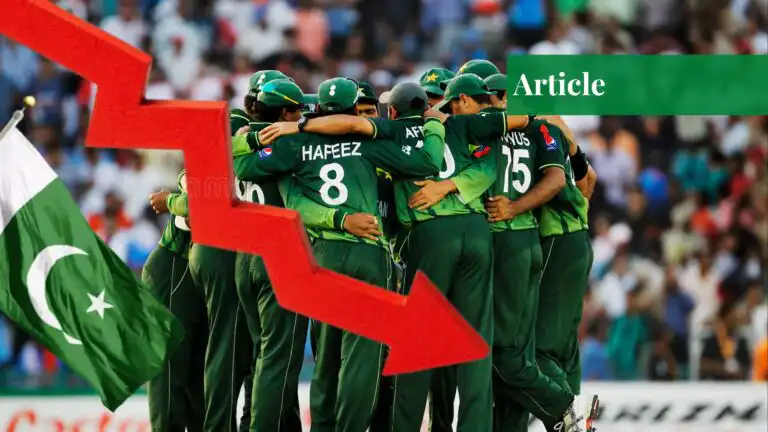To say that Pakistan is a cricket-mad country would be an understatement. Its cricket team is not only a source of intense national pride but is also infused with the national identity. Pakistan Cricket has produced greats such as Imran Khan, Wasim Akram, Waqar Younis, Saeed Anwar, and Inzamam-ul-Haq, just to name a few. They have inspired the nation and youth and have proved that Pakistanis can compete and excel on a global level.
Unfortunately, professional sports in Pakistan have been on the decline for some time now. From cricket to hockey and squash, Pakistan’s recent performances have been dismal. The decline of cricket especially has been very painful for Pakistanis. It is heartening to see a once great side, losing games even to sides that are considered mediocre.
Given Pakistan’s performance at the 2024 T20 World Cup, the recent shocking home series loss to Bangladesh and it’s recent ouster from the ICC Champions Trophy 2025, it is time for some serious introspection. This article looks into the causes of the decline of cricket in Pakistan and offers recommendations to revive it.
Political Instability
Pakistan and political instability go hand in hand. There has hardly been a time when there hasn’t been some sort of crisis in Pakistan. But despite this, Pakistani cricket and politics have largely existed in parallel universes, and international cricket has thrived. The 90s are a great example of this, Pakistan managed to win the World Cup in 1992, produce cricketing greats, and have one of the strongest international sides till the 2003 World Cup. With political stability and consistency, more focus can be attributed to finding and nurturing the best talent and rooting out corruption and favoritism. This applies not only to cricket but also to other sports, e.g. hockey, and squash, where Pakistan once dominated.
Scouting the Best Possible Talent
If a country cannot find and nurture the best possible talent, it cannot create a world-class team. To cultivate the best talent for the national team, it is important to first make the domestic cricket circuit excellent. The current domestic structure consists of 3 main streams, which are tiers, regional associations, and departmental cricket. There are 6 tiers: central, northern and southern Punjab, Sindh, Khyber Pakhtunkhwa, and Balochistan. There are 16 regional associations (Abbottabad, Islamabad, Lahore, etc.) and about 40 departmental cricket teams that are sponsored by corporations such as HBL, UBL, PIA, etc.
On paper, this seems to be a highly confusing structure. The PCB announced in 2022 that six scouts had been appointed for regional associations, but are they enough? Are there scouts for the regional and departmental teams? No one knows at this point. What is their process and method of selection? Again, there is little information. Scouts should be sent to remote locations as well to find the best talent and give them proper guidance. The selection process must be more streamlined, with elements of corruption and connections removed from the process, and selection based purely on merit and ability.
The domestic players must also be given more financial compensation so they can support their households and it becomes a legitimate career opportunity. Talent hunters should also visit major university cricket tournaments like those of LUMS, LSE, FAST, and GIKI, and scout talent from there. I have personal experience in playing inter-university cricket and can confidently say that the level of talent I found there was unmatched. The players just need to be guided in the right direction to play professionally. If there is ample substitute talent waiting, it would encourage competitiveness among the currently selected players and keep them on their feet.
Rise of T20/Leagues
The rise of T20 cricket leagues has, in the opinion of some, deteriorated the standards of international cricket. The short format of the game is focused on style over substance. It does not encourage players to play technical shots, build stamina, or improve their art, but rather on blind hitting and entertainment. T20 tournaments are merely commercial entities and do not encourage technique and resilience. Wasim Akram says of T20, “bowlers are paid to get hammered,” hence saying it is not a bowler-friendly format.
Players now put more emphasis on international T20 leagues (CPL, BPL, IPL,) for personal and financial gain rather than on representing their country or improving their art of cricket. A case in point is that of Haris Rauf in 2023 where he refused to play test matches for the Australia tour, citing it would put too much stress on his body. More focus should be placed on ODIs and test matches to improve the player’s technique, stamina, and art. Focus needs to be diverted from this dumbed-down form of cricket.
Improving Work Ethic & Fitness
The players and management must ensure a rigorous work ethic and regimen for the players. This includes dietary, physical, and mental exercises to keep the players fit and able for games. There have been reports that the players’ diet is a concern, with them consuming unhealthy amounts of biryani, oil-rich meat, and sweets. Such diets are not sports incentives and would hamper the player’s performance in the games. Recent videos have emerged of players doing their fielding and catching practice on mattresses. Such pampering will only soften the players and negatively affect performance.
Players and coaching staff must ensure that the players are mentally and physically fit, for all formats of the game and come up with training and diet plans as such. Families should not be allowed on foreign tours, as they distract the players from their performances, case in point is the 2024 T20 World Cup in the USA. Younger talent needs to be sent abroad for exposure to 50-over cricket formats such as county cricket.
The culture of sifarish and grouping in the team needs to be eliminated and selection should be only on merit and fitness. If even after ample chances are given to a player he is still not performing, he should be given rest and replaced with new talent, no matter how big a fan base he has. The board can look at incentive-based pay, as this will further encourage players to hone their skills and perform.
Lack of International Tours in Pakistan
Because of the terrorist attack on the Sri Lankan cricket team in 2009, Pakistan has suffered from teams refusing to play in Pakistan. Pakistan must improve its security situation, build international trust, and always discourage playing home games on neutral venues. Denying Pakistani fans the joy and inspiration of seeing the national team play in front of them can be detrimental to the fans. They hence do not get inspired and do not aspire to become professional cricketers themselves.
Although recently, top international teams have toured Pakistan, they have been few and far between. The board needs to improve its stadiums and adjoining infrastructure to accommodate big international series and events. Recent reports have emerged that stadiums are not at par with international standards to host the Champions Trophy 2025, and work is now being done to address the issue.
The biggest draw in the game is undoubtedly India vs. Pakistan. The board needs to encourage the India-Pakistan series, in the spirit of the 2004-2006 tours. This will attract a massive audience not only in India and Pakistan but the world over, and provide a much-needed revenue boost for the PCB. New stadiums must be constructed in Islamabad, and picturesque locations in the northern areas of Pakistan and Kashmir to further attract teams and tourists. This way, international teams will willingly tour here instead of being persuaded to do so. There is also a need to bring back tri-nation ODI tournaments, like the Sharjah Cup.
Match Fixing/Corruption
Various match-fixing scandals have rocked the Pakistani and international cricket fraternity. It must be noted that not only Pakistani players but players from other nations have also been charged with match-fixing. The 2010 spot-fixing episode of Pakistan cricket was highly devastating. There were even rumors that management was aware and would look the other way when it came to match-fixing practices.
The board and the government must take stringent actions to ensure match-fixers and bookies do not infiltrate the squad and management, with strict punishments being handed out to anyone involved. Fixing matches and intentionally losing games is damaging for the spirit of the game, and lowers the morale of both the fans and players. The board must therefore make sure that the players and management are amply compensated so that there is no space or temptation of fixing matches for money.
The working of the Pakistan Cricket Board is also called into question. In the past 5 years, it had the post of chairman filled with political appointees who have no background in cricket, barring Ramiz Raja. There are also allegations that the board is overstaffed with many irrelevant appointments, making the working of the board inefficient.
Conclusion
Sports is an important factor in uniting any country. It helps to create a national identity and is something that is collectively followed. It is followed regardless of social class, caste, and creed. The whole of Pakistan watches the men in green wearing national colors and representing them on an international stage. It is a source of immense pride and joy for the people. The entire country celebrates the wins and shares in the sorrow of loss.
The recent gold medal by Arshad Nadeem in the 2024 Olympics has brought immense joy to the citizens. It was not only a gold but a new Olympic world record as well. This has brought to mainstream the Olympics games for the Pakistani audience, and proves that Pakistani athletes are not only capable but are also able to excel in such events. The government therefore should focus on developing athletes for the games as there is tremendous potential in the fields of running, swimming, climbing, weight lifting, wrestling, and numerous other events.
In a divisive political time, it is essential that national athletes play well, and in team sports, show fight even when losing. This raises the national morale and vice versa. The decline of cricket has especially been painful for fans, and the board and all relevant concerned need to act stringently to not damage the legacy of Pakistan cricket. The government must give sports, not only cricket but hockey, football, tennis, the Olympics and other sports a high degree of importance and attention, giving representation to all regions of Pakistan and selections based on merit. This will give a much-needed sense of joy to the nation and return to the glory days of the past.
If you want to submit your articles and/or research papers, please visit the Submissions page.
To stay updated with the latest jobs, CSS news, internships, scholarships, and current affairs articles, join our Community Forum!
The views and opinions expressed in this article/paper are the author’s own and do not necessarily reflect the editorial position of Paradigm Shift.
Jasim Tahir holds a bachelor's degree in marketing and media from the Lahore School of Economics and an MBA with a double major in finance and marketing from SZABIST Islamabad. Writing in his free time, he enjoys exploring insights on socio-economic issues and topics. Beyond writing, he is passionate about film, TV, and sports, always seeking fresh ideas and perspectives.






